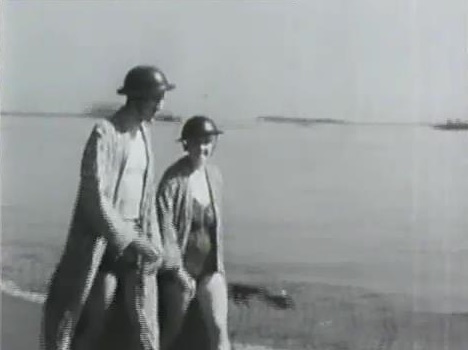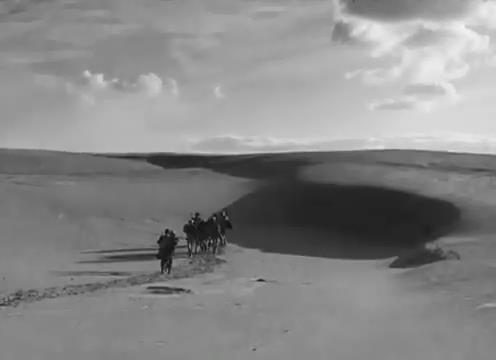The Front Line

Dover,
1940.
“Whatever
happens, they’ll carry on.” View of “Calais, for the moment
part of the Greater German Reich.” Attack on a convoy
in the Channel.
Bomb
damage. High
morale. Mrs. McEwan on “that rat Hitler.”
Target for To-Night
It drops from the
sky, an “irrefutable negative”, goes right to the photographic arm
for analysis. The main area is elsewhere, a formation is diverted for it.
Oil barges fed from
forest tanks, Wellingtons paste the place. A complicated drama ensues upon
this, all a second pilot does is pump oil, ours minds the plane while the first
pilot sees to the wireless operator’s leg, hit by flak, oil pressure
drops, the first pilot resumes his seat and lands in fog at night with a rough
port engine and no wireless at all.
None of the
actors is not what he appears.
Nine Men

“Moonfaced
paralytics” in battle training get “un petit peu” from the sergeant, “out
in the Middle East in one of those desert shows...”
John M. Stahl’s
Immortal Sergeant is concurrent, just
ahead of Zoltan Korda’s Sahara
(cf. John Ford’s The Lost Patrol).
From the author
of Night and the City (dir. Jules
Dassin or Irwin Winkler), associate producer Charles Crichton, cinematography
Roy Kellino, score John Greenwood, producer Michael Balcon, Ealing of Oxford Street.
“Since when
do they have saints in hell!”
“Delirious.”
A
tight spot. “Live and
learn, chum. It’s like something else you don’t think’s
important till you leave it off.”
“Aye.”
A
slim chance. “Well, every
little helps, the girl said to the sailor.”
Right up against
it. “Always got to be on the think in the desert or they’ll get
you.”
Defense against
the Italians, loading and firing at a steady pace, a soldier’s business,
stores nearly empty. “Don’t forget to push the boat out, Booky.” A resemblance to Farrow’s Wake Island in the final battle will be
noted. “In the name o’ the wee man!”
Mark
Duguid (British Film Institute), “stirring
propaganda”. TV Guide, “intelligent, gripping”.
Hal Erickson (Rovi), “produced by Ealing
Studios, which after the war forsook melodrama for comedy and social satire.”
Halliwell’s Film Guide, “sharp
semi-documentary of the war which paled against the mightier epics to follow.”
George Perry (Forever Ealing) finds it “relatively
straightforward”.
The Overlanders
It had to be
created on the hoof. “Producer Michael Balcon sent director Harry Watt to
Australia with a mandate to make a picture representative of that
continent” (Variety).
The major
analysis is by Hawks in Red River, Watt’s associate producer Ralph
Smart clarified the structure in Bitter Springs.
“It is not
only an impressive picture of Australia but it is an exciting and captivating
entertainment as well” (Bosley Crowther, New York Times).
“Epic
reconstruction of a 1942 cattle-drive” (Time Out Film Guide).
“Attractive,” says Halliwell’s Film Guide,
“easy-going”.
Great score by
John Ireland.
George Perry (Forever
Ealing) has “basic to the point of banality,” but admired the
scenery.
Where No Vultures Fly
The East African
game warden thinning out breeds where great herds roamed, in the opening shot
he walks onto an empty plain, he is under orders, “feeding the vultures.”
He quits to form a national park, and Watt is just the genius to see
him do it, a director of great speed who can tell an hour-long story in ten
minutes.
This is needed,
because the manifold interests in the country “couldn’t even agree
where to put the new public lavatory.” The vexed former game warden
writes a Swiftian letter to the editor espousing
total eradication of the “verminous” wild
animal population, to be carried out by the military, and signs a
foreigner’s name to it.
In the shadow of
Kilimanjaro, the park is founded.
George Perry (Forever Ealing) sees “flat spots
that could have been eliminated by tighter editing.”
Dr. Wendy
Webster, writing for the British Film Institute, argues against it and its
premise.
In an unusually
poetic and perceptive review, A.W. of the New
York Times concluded the film was “wholly interesting and often
exciting,” Ivory Hunter was the
American title, he made a point of mentioning the
original.
Variety
could not follow it, “plot is of little consequence,” Time Out Film Guide likewise. “An
inspiring story with humane values,” opines the Catholic News Service
Media Review Office, “entertaining family fare.” It is necessary to
defend the park. “All right, I say, take
it, take a table, but once
you’ve taken it, what you going to do with it? Once you’ve got hold
of it, where you going to take it?”
“You’d
probably sell it.”
“Wouldn’t
get much for it.”
“Chop it up
for firewood.” And this is the main drama. When the game warden’s
new staff celebrate “no vultures” with a bit of singing and so on,
it’s a John Ford (who knows Africa) photographed by Geoffrey Unsworth in
Technicolor. Trees full of waiting vultures are a sight for Hitchcock’s The Birds.
Kubrick probably
remembers the bushbaby in 2001: A Space
Odyssey.
Watt even may be
said to have taken into account Clarence Brown’s The Yearling, and that is a tall order given the circumstances.
Hawks (Hatari!), Ford (Mogambo), Huston (The Roots
of Heaven), Nicholas Ray (Wind Across
the Everglades), Ritt (Hud, where
the rinderpest solution is applied).